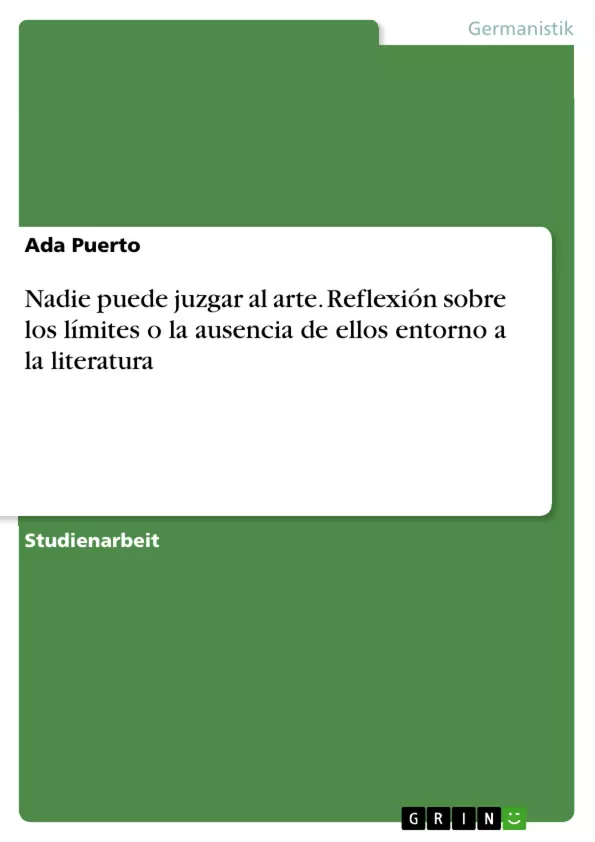¿Hasta dónde queremos aceptar? ¿Tenemos un límite?
Lo que hace de la literatura algo tan perfecto es su falta de perfección y de intención de serlo.
Inhaltsverzeichnis
- Nadie puede juzgar al arte: reflexión sobre los límites o la ausencia de ellos entorno a la literatura
- ¿Es el plagio literatura?
- ¿Dan las obras más extensas una mayor sensación de seriedad y calidad?
- Ver Zuckerbabys
- Der Trank
Zielsetzung und Themenschwerpunkte
Dieser Text befasst sich mit der Frage, ob es Grenzen für die Literatur gibt und, falls ja, wo diese liegen. Die Autorin argumentiert, dass es keine festen Definitionen oder Regeln für Literatur gibt, und dass dies ihre Besonderheit und Faszination ausmacht. Sie stellt die These auf, dass die Literatur nicht immer angenehm oder schön sein muss und dass sie sogar beunruhigend oder unangenehm sein kann, ohne ihre Eigenschaft als Literatur zu verlieren.
- Die Definition von Literatur
- Die Rolle der Kunst, Moral und Religion in der Literatur
- Die Grenzen der Literatur und die Frage des Plagats
- Die Relevanz von Literatur für verschiedene Lesergruppen
- Die Vielseitigkeit der Literatur und ihre Fähigkeit, Gefühle und Reflexionen zu wecken
Zusammenfassung der Kapitel
Der Text beginnt mit einer allgemeinen Betrachtung der Definition von Literatur und argumentiert, dass diese schwer zu fassen ist. Die Autorin verweist auf verschiedene Definitionen und Theorien von bekannten Autoren und Philosophen. Sie diskutiert auch die Frage, ob es bestimmte Eigenschaften oder Merkmale gibt, die Literatur von anderen kulturellen Objekten oder Aktivitäten unterscheiden. Anschließend wird die Frage nach den Grenzen der Literatur aufgeworfen, insbesondere im Zusammenhang mit dem Plagiat.
Im nächsten Abschnitt beschäftigt sich die Autorin mit der Frage, ob die Länge eines Werks seine Seriosität und Qualität beeinflusst. Sie argumentiert, dass auch kürzere oder weniger anspruchsvolle Werke einen Wert haben können, insbesondere für Leser mit geringerer Bildung oder Erfahrung. Sie plädiert für die Vielfalt der Literatur und dafür, dass jedes Werk seine eigene Funktion und Bedeutung hat.
Der Text endet mit einer Schlussfolgerung, in der die Autorin betont, dass Literatur keine vorgegebene Essenz oder ein reduzierbares Konzept hat. Sie ist ein dynamisches Konstrukt, das immer wieder neu definiert und interpretiert wird. Die Autorin betont die Bedeutung der Literatur als Mittel, um Gefühle und Gedanken zu vermitteln und zu provozieren, unabhängig davon, ob diese angenehm oder unangenehm sind.
Schlüsselwörter
Die zentralen Themen des Textes sind die Definition von Literatur, die Grenzen der Literatur, die Frage des Plagats, die Relevanz von Literatur für verschiedene Lesergruppen und die Vielseitigkeit der Literatur. Weitere wichtige Begriffe sind Kunst, Moral, Religion, Literaturkritik, Intertextualität, ästhetische Erfahrung und emotionale Wirkung.
Häufig gestellte Fragen
Kann Kunst oder Literatur objektiv beurteilt werden?
Die Arbeit argumentiert, dass Literatur keine festen Grenzen hat und ihre "Unvollkommenheit" oft Teil ihrer Qualität ist.
Gilt Plagiat auch als Literatur?
Der Text reflektiert über die Grenzen des Plagiats und ob die Übernahme fremder Texte unter bestimmten künstlerischen Aspekten als Literatur gelten kann.
Sagt die Länge eines Werkes etwas über dessen Qualität aus?
Die Autorin hinterfragt, ob umfangreiche Werke automatisch seriöser wirken, und betont den Wert kürzerer Texte für unterschiedliche Lesergruppen.
Muss Literatur immer "schön" oder "angenehm" sein?
Nein, Literatur kann auch beunruhigend oder unangenehm sein, solange sie Gefühle weckt und Reflexionen beim Leser auslöst.
Was ist die Rolle von Moral und Religion in der Literatur?
Der Text untersucht, inwieweit gesellschaftliche Normen die literarische Freiheit einschränken oder ob Kunst völlig unabhängig davon existieren sollte.
Wie definiert die Autorin Literatur in dieser Reflexion?
Literatur wird als ein dynamisches Konstrukt ohne feste Essenz beschrieben, das durch die Interaktion zwischen Text und Leser immer wieder neu entsteht.
- Quote paper
- Ada Puerto (Author), 2017, Nadie puede juzgar al arte. Reflexión sobre los límites o la ausencia de ellos entorno a la literatura, Munich, GRIN Verlag, https://www.grin.com/document/385448



